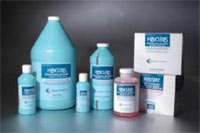How to Protect Yourself in the Hospital
Whether from an access clot, chest pain, or a broken bone, at some point you may need a hospital stay. If you know what to ask, you can feel better and help avoid errors.
Pack a hospital kit
 Any time you go to the ER, you may be admitted. Pack a small bag with a folder of key papers and comfort items—and you'll have what you need. Include:
Any time you go to the ER, you may be admitted. Pack a small bag with a folder of key papers and comfort items—and you'll have what you need. Include:
- An up-to-date list of drugs you take, the dose, and how often you take each one ( don't bring your own drugs unless the hospital does not have them)
- Your medical history, including your dialysis prescription
- Contact information for your doctor and dialysis center
- All of your health insurance and/or Medicare cards
- A list of phone numbers of loved ones
- A hair brush, toothbrush, toothpaste
- Hand sanitizer to keep by your bedside
- Underwear, warm socks, and a pair of slippers with rubber soles
- A black-out sleep mask and ear plugs to help you sleep
- Your own pillow or neck pillow, if you prefer a special kind
- Books, magazines, or puzzles in case you need something to do
- A comfortable change of clothes to wear home
The hospital will provide gowns, robes, and towels—you don't need to bring these. Most hospitals have a TV set for each bed, with many channels that may include radio. Bring a cell phone and charger if you have one.
Tip: Leave your watch, jewelry, and valuables home, so you don't have to worry about losing them. Don't bring credit cards or large amounts of cash.
Ask questions and know your rights
 Learn your options if you need a procedure. Is there more than one way to achieve the same result? How many times has the doctor done the procedure? Practice makes perfect: it is safer to go to someone who has done the procedure you need as many times as possible. If the doctor has not (or has done so only a few times), do you have another choice of doctor or hospital?
Learn your options if you need a procedure. Is there more than one way to achieve the same result? How many times has the doctor done the procedure? Practice makes perfect: it is safer to go to someone who has done the procedure you need as many times as possible. If the doctor has not (or has done so only a few times), do you have another choice of doctor or hospital?
What kinds of anesthesia can you do? For a short procedure, are you better off with local or spinal anesthesia instead of general? Often, you'll have a choice. Before you leave post-op after a procedure, be sure your pain is controlled—or you'll be playing "catch-up" to try to get on top of it. Ask for more medication if you need it.
Do you go to a teaching hospital? If so, you need to know that you always have the right to refuse to permit medical students to be present. If you can plan your stay, avoid weekends—very little happens then.
Across the U.S., residency programs for doctors in training start on July 1. This is a good reason not to have elective surgery in July. If you must be in a hospital in July, ask about the training of each doctor who sees you. Insist that the staff doctor do your procedure—not a doctor in training. You can add this to your surgical consent form.
You can ask to read your chart each day, to be sure that your blood tests look good and your recovery is going well. Ask for a copy of your hospital's Patient Bill of Rights. If you do run into a snag, each hospital has a Patient Representative who can help resolve disputes. Ask the nurse to call this person for you if you need to.
In-hospital dialysis
In most hospitals, dialysis is done at the bedside or in a small unit by acute dialysis nurses. You may have one nurse who gets to know you very well and is there for each treatment. But, even acute care nurses may not know about PD, daily, or nocturnal home hemodialysis (HD). And the floor nurses may not know about dialysis at all. This is where mistakes can be made.
Are you on PD? Call your PD nurse before you enter the hospital, or as soon as you can once you're there. You'll need supplies if you can do PD in the hospital. It is safest if you can do your own exchanges if you feel up to it. If not, only permit staff who are trained in PD, to avoid infection. Floor staff need to know that your PD catheter is for dialysis only — it is not a way to give drugs or nutrition. You can get peritonitis if your catheter is misused. Ask for a sign above your bed, and have someone write this in permanent marker on your belly.
When peritonitis brings you to the hospital, you may need to do HD until you heal. If you don't have an HD access, a temporary HD catheter will be placed. When your stay is for a hernia repair or other problem, you may be able to do low-volume, recumbent-only (LVRO) PD and avoid a hemo catheter. Read about LVRO PD here.
If you do daily or nocturnal HD, you may be able to keep doing this in the hospital. If not, you will need to adjust your diet for standard HD. Failing to limit potassium when you switch to standard HD can be fatal. Choose foods that are on your diet. If you did not choose a meal, don't assume that your tray has the right foods—mistakes happen. Look at what you get. Ask before you eat or drink something you're not sure of.
Ask about drugs you are given before you take them —including IV drugs. Are they safe with kidney failure? Do you need a lower dose? Has your kidney doctor been consulted? Are your fluid levels being watched, since you don't make much (or any) urine? If you have diabetes, your blood sugar control can be thrown off by the change in routine, illness, or stress. Check your sugars and be sure your insulin or oral drugs are adjusted, too.
Prevent infection
 With so many sick people in one place, hospitals are hotbeds of infection.
Any surface in a hospital can harbor harmful bacteria—wash your hands often.
You can help protect yourself if you:
1
With so many sick people in one place, hospitals are hotbeds of infection.
Any surface in a hospital can harbor harmful bacteria—wash your hands often.
You can help protect yourself if you:
1
- Check that staff wash their hands or use alcohol-based cleanser before they touch you. Gloves protect them—not you. They may be dirty.
- With kidney failure, your immune system may not work as well. A private room can help you avoid infection.
- Ask your visitors to wash their hands.
- Be sure stethoscopes are wiped with an alcohol pad before use.
- Choose a surgeon with a low infection rate if you need surgery.
- If surgery is planned ahead, shower each day with 4% chlorhexidine soap (e.g., Hibiclens) for 3 to 5 days. A drugstore can order this for you without a prescription.
- Are you a staph. aureus carrier? Ask for a simple swab of your nose. If you are a carrier, your care team can take extra steps to protect you from infection.
- Do you smoke? Quitting before surgery improves blood flow and helps speed healing.
- Ask about getting an antibiotic one hour before surgery. This helps reduce the risk of infection.
- Using a warming blanket during surgery can help you fight infection afterward.
- If hair must be removed from a surgical site, a clipper is safer than shaving, which leaves tiny nicks in your skin.
- Refuse to allow extra people (like medical students) in the operating room—each brings bacteria in.
- Note when your IV is placed—it should be changed every 3 to 4 days.
Bring an advocate
Hospital nurses are busy, and you may have to wait to get what you need. It is best if you can have someone with you all the time who knows your wishes. You may need more than one person to do this. The more severe your problem is, the more vital it is to have someone who is there just for you.
Your advocate can be your eyes, ears, and legs. To reduce drug errors, an FDA rule requires hospitals to have bar code systems that match your ID bracelet with your drugs before you get them. Your advocate can write down which drugs you should get at what times, and check off that you receive them—and in the right dose.
If a meal does not arrive, you're in pain, or something goes wrong, your advocate can find help. He or she can watch you for changes, get things out of your kit, and do other small helping tasks. Unless your advocate has had hospital training, he or she should not help you get out of bed without a trained staff person to help. You don't want to risk a fall that could injure you both.
Conclusion
You can't always avoid a hospital stay, but you can take steps to protect your comfort and safety while you're there.
References:
- 15 Steps you can take to reduce your risk of a hospital infection. Accessed July 2007.

